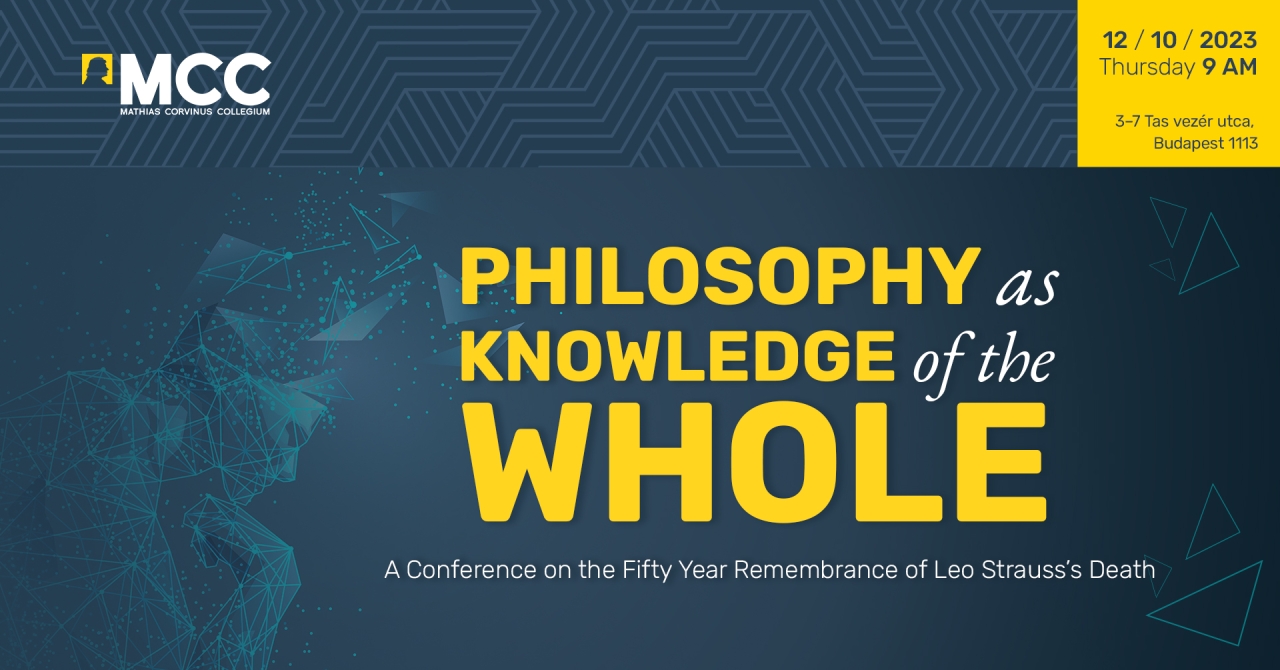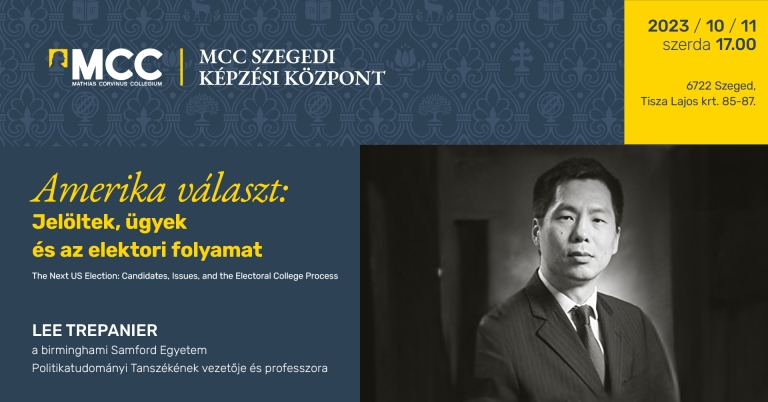Leo Strauss (1899-1973) is one of the greatest political thinkers of the twentieth century. Perhaps he was the most mindful of the meaning and relevance of political philosophy in Western culture. He was born and studied in Germany, and as a young philosopher his thought was captured by Heidegger, Husserl and Carl Schmitt among others, and he dedicated his early works mainly to Jewish thought. Strauss, in the 1930s, turned to early modern philosophy where he discovered political philosophy parallel the conflict between faith or revelation and reason, the conflict he later called the conflict between „Athens” and „Jerusalem”. After his emigration to the US, he was almost completely devoted to the history of political philosophy which he divided into the classical and the modern age; the beginning of the break is designated to Machiavelli’s political works. His works after WWII first focused on modern political philosophy, then on the classical equivalent. But whatever author or period he concentrated on his main message was that without political philosophy there is hardly any serious understanding of politics. Strauss believed that political philosophy as such is still relevant despite the dominance of modern positivism. Philosophy as the knowledge of the whole can never be claimed to be obsolete, because man’s nature is always the same, and the most relevant issues of man are rooted in man as a communal being, hence the relevance of political philosophy as well.
The Center of European Political Philosophy at the MCC was launched in order to take seriously classical European political philosophy. After a long absence political philosophy should return from America to Europe. The home of political philosophy, since its birth in Greek soil, has been located in European culture. In the interwar period, however, for political reasons many European scholars, including political thinkers, moved to America seeking shelter against various forms of lethal political regimes. The renaissance of political philosophy in the 20th century was initiated by émigrés like Leo Strauss, Eric Voegelin, Hannah Arendt, and some others who either emigrated to other part of the world, like Karl Popper, or moved within Europe, like F. A. Hayek, A. Kojéve, or Isaiah Berlin, or stayed at home like Michael Oakeshott, Jacques Maritain, or Raymond Aron. As Leo Strauss put it “It is not self-forgetting and pain-loving antiquarianism nor self-forgetting and intoxicating romanticism which induces us to turn with passionate interest, with unqualified willingness to learn, toward the political thought of classical antiquity. We are impelled to do so by the crisis of our time, the crisis of the West.”
The conference is meant to commemorate Leo Strauss’s legacy and deepen the understanding the role of political philosophy today. Registration is required.
12 October (Thursday)
9.00 AM Opening Remarks
- Zoltan Szalai, Director General, MCC
- Andras Lanczi, Director of the European Center for Political Philosophy, MCC
9.30 AM Keynote Speech
- Michael Anton (Claremont) – “Strauss on the Ancients and the Moderns in Thoughts on Machiavelli”
10.30 AM Break
10.50 AM Strauss and the Ancients
- Chair: Robert Papp
- Laurence Lampert (Indiana, retired) – “Strauss’s Blunder: ‘the time, i.e., the year’ of the Republic”
- Iraj Azarfaza (Tehran) – “Leo Strauss on Xenophon’s Grudge against Socrates”
12.00 PM Lunch break
2.00 PM Strauss and Contemporary Conservatism
- chair: Andras Lanczi
- Andreas Kinneging (Leiden) – “The Conservatism of Leo Strauss”
- Zbigniew Janowski (Towson, retired) – “Is Leo Strauss Still Worth Reading?”
3.00 PM Break
3.15 PM Strauss and the Moderns
- chair: Arthur Milikh
- William Wood (MCC) – “’Philosophy Is to Fulfil the Function of Both Philosophy and Religion’ – Leo Strauss, Machiavelli and the Nature of Modernity”
- Timothy Burns (Baylor) – “Leo Strauss on the Origin and Character of Modern Democracy”
4.20 PM Break
4.40 PM Strauss and other Authors
- chair: Róbert Papp
- Guillermo Graino Ferrer (Francisco de Vitoria Madrid) – “Authority, the People and Esotericism in the Erudite Libertines and Pascal”
- Till Kinzel (Technische Uni Berlin) – "The Significance of Friedrich Heinrich Jacobi for the Philosophy of Leo Strauss"
5.40 PM End of conference, closing remarks
- Andras Lanczi
If you have any questions before or during the conference, contact Robert Papp (+36 30 429 5886, papp.robert@mcc.hu).
Prof. dr. András Lánczi is a Professor of Political Science and Philosophy at the Corvinus University of Budapest, of which he was the Rector between 2016-2021. Currently, he is a member of the Board of Trustees at the Mathias Corvinus Collegium, and the Head of the European Center of Political Philosophy. He is one of the founders of the Mathias Corvinus Collegium’s European Centre of Political Philosophy. He has published several books both in English and Hungarian, translated books by Strauss into Hungarian, and studied the history of twentieth century political philosophy.
Prof. dr. Andreas Kinneging is a Professor of Philosophy of Law at the University of Leiden. He has published extensively, in both Dutch and English, on constitutional theory, ethics -especially virtue ethics - the history of philosophy, and metaphysics. Some of his notable books include ‘Aristocracy, Antiquity, and History’, Translation 1997, ‘The Geography of Good and Evil’, ‘De Onzichtbare Maat’, Prometheus 2020. He is one of the founders of the Mathias Corvinus Collegium’s European Centre of Political Philosophy.
Prof. Zbigniew Janowski is a graduate of The Committee on Social Thought at the University of Chicago, author of several books on Descartes and editor of two volumes of Leszek Kolakowski's essays and two volumes of John Stuart Mill's previously unpublished writings. He is also the author of Homo Americanus: The Rise of Totalitarian Democracy in America. He is one of the founders of the Mathias Corvinus Collegium’s European Centre of Political Philosophy.
Dr. William Peter Wood is a postdoctoral scholar at the University of Pardubice and the principal investigator of a research grant from the Czech Science Foundation (GAČR). He received his PhD from the University of Chicago with a doctoral thesis on the philosophy of Nietzsche, and his interests include post-Kantian continental philosophy, ancient philosophy, political philosophy, and the philosophy of religion. He has published nine articles on themes such as Nietzsche, Leo Strauss and the problem of religion in modernity and he is currently working on a monograph on Nietzsche's relationship to the ancient Epicurean tradition. He is a Visiting Fellow at the Mathias Corvinus Collegium. He is one of the founders of the Mathias Corvinus Collegium’s European Centre of Political Philosophy.
Michael Anton is a lecturer in Politics and Research Fellow at Hillsdale College's Kirby Center in Washington, DC. He previously served in national security positions in the Trump and Bush (43) administrations, as well as in the administrations of California Governor Pete Wilson and New York Mayor Rudy Giuliani. He has extensive experience in the private sector and was educated at the Claremont Graduate University, St. John's College, and the University of California. He is also the author of the newly released book, The Stakes: America at the Point of No Return. He is a senior fellow at the Claremont Institute.
Guillermo Graíño Ferrer is Full-time Assistant Professor of Political Theory at the Universidad Francisco de Vitoria de Madrid. Full-time Visiting Professor at LUISS Guido Carli (Fall 2020, Fall 2018) and at Villanova University (Fall 2016), he also has been invited to lecture for shorter periods at George Mason University, The Hague University of Applied Sciences and Chemnitz University of Technology. PhD in Political Science (Universidad Autónoma de Madrid, 2011) and PhD in Philosophy (Scuola Internazionali di Alti Studi, Fondazione Collegio San Carlo di Modena, 2018), he has been Visiting Researcher at the University of Toronto and at the École des Hautes Études en Sciences Sociales. His main areas of interest are Early Modern French Philosophy, Contemporary Political Theory and Political Ideologies.
Laurence Lampert is a Canadian philosopher and a leading scholar in the field of Nietzsche studies. He is also well known for his interpretations of Plato and Leo Strauss. He received his master's degree in 1968 and his doctorate in 1971, both from Northwestern University, with a dissertation was on “The Views of History in Nietzsche and Heidegger.” He has published many influential articles and books, including Nietzsche’s Teaching: An Interpretation of “Thus Spoke Zarathustra” (1987), Nietzsche and Modern Times (1993), Leo Strauss and Nietzsche (1996) and The Enduring Importance of Leo Strauss (2013). He taught at Indiana University–Purdue University Indianapolis for 35 years and remains a professor emeritus of philosophy.
Iraj Azarfaza is an assistant professor at the University of Isfahan, Iran. He spent his postdoctoral studies studying with Prof. Heinrich Meier at Siemens Foundation in Munich, Germany in 2020-2021. His main research interests are: Classical Political Philosophy, Plato, Xenophon, and Leo Strauss. His last article is titled, “Overcoming the Powerful Prejudice against Xenophon: A Debate between Leo Strauss and Friedrich Schleiermacher,” and was published in Interpretation: A Journal of Political Philosophy.
Till Kinzel received his Dr. phil. (2002) and Habilitation (2005) from the Technical University of Berlin; he has published books on Allan Bloom (Platonische Kulturkritik in Amerika; 2002), Nicolás Gómez Dávila (5th ed. 2023), Philip Roth (Die Tragödie und Komödie des amerikanischen Lebens, 2006) and Michael Oakeshott (2007); and co-edited volumes on imaginary dialogues (2012, 2014, 2017), audionarratology (2016), Edward Gibbon (2015) as well as on the German Enlightenment. His most recent books are "Johann Georg Hamann. Zu Leben und Werk" (2019) as well as a German translation of Walter Scott's essay on E. T. A. Hoffmann and the Supernatural (2022) as well as new edition of an 18th century German translation of Oliver Goldsmith's "The Vicar of Wakefield" (2023).
Timothy W. Burns a Professor of Political Science at Baylor University. He has also taught at Hiram College, Texas State, Boston College, and Skidmore College. For the 2022-23 academic year he was the John and Daria Barry Visiting Research Scholar at Princeton University. His most recent book is Leo Strauss on Democracy, Technology, and Liberal Education. He is also the author of Shakespeare’s Political Wisdom (2013), editor of Brill’s Companion to Leo Strauss’ Writings on Classical Political Thought (2015), and co-editor (with Bryan-Paul Frost) of Philosophy, History, and Tyranny: Re-examining the Debate Between Leo Strauss and Alexandre Kojève (2016). He has written on Homer, Plato, Thucydides, Xenophon, Aristophanes, St. Augustine, Shakespeare, Hobbes, Turgot and the Federalists, G.K. Chesterton, John Courtney Murry, and Leo Strauss. and he is Editor-in-Chief of Interpretation: A Journal of Political Philosophy.


